- Home
- Vince Flynn
The Last Man Page 3
The Last Man Read online
Page 3
Zahir rubbed his head with his right hand. “I heard a rumor.”
“What kind of rumor?”
“That something had happened to Mr. Rickman.”
“Keep going.”
“That something very bad happened. That he was missing.”
“And you learned this how?”
Sharing information without getting something back was very foreign to Zahir, so he lied. “One of my men saw Mr. Hubbard leave the base in a panic. I started to make calls and soon found out that something was wrong at Mr. Rickman’s house.”
“So you were concerned for Mr. Rickman.”
“Yes.”
“And that’s why you showed up here acting like a jackass and threatening people.”
“No, I was concerned.”
Rapp glanced at his watch. It was eight minutes past ten in the morning and he had a growing list of priorities that needed his immediate attention. Zahir, as disreputable as he was, might indeed have some use. Rapp made a quick decision. “Here’s what we’re going to do. You will work for me. You will find out who grabbed Mr. Rickman and you’ve got forty-eight hours to come up with the answers I need. If you fail me you’re a dead man.”
Zahir once again tried to retreat. He needed room to think and he couldn’t do that with a gun in his face, but it did no good. The American simply followed him. Zahir’s eyes pleaded for Hubbard to give him a reprieve. He didn’t receive any help so he reverted to what he knew best. “How much will you pay me?”
Rapp laughed, but there was no levity in it. “I’m not going to pay you shit. In fact I’m going to do the exact opposite. If I find out you’re fucking me, I’m going to text your photo to every jerkoff with a gun in this town and on the other side of the border as well, and I’m going to put a five-hundred-thousand-dollar bounty on your head. And if you think about heading for the hills I’ll have a Predator on you twenty-four seven. If you make a call, if you step into the clear for a second I’ll shove a Hellfire missile up your ass and blow you to hell.”
To Zahir, the threat was all too real. He had used the CIA to decimate his own enemies by giving up their locations and phone numbers. The drone strikes were very effective. After a little consideration Zahir realized that at least for the moment he had no choice but to go along with this man. He slowly nodded his head and said, “I will see what I can do.”
“If you want to live, you’ll do more than that.” Rapp lowered his gun and said, “Give me your phone.”
Zahir scrambled to retrieve the phone from the breast pocket of his blue-gray uniform shirt. He surrendered it to Rapp, who handed it to Hubbard. “Go upstairs and give this to Sid. Tell her I want the usual and have our friends stateside move it into heavy rotation. Tell her I need a clone as well.” Hubbard left and Rapp turned his focus back to Zahir. “We’re going to be listening to everything you say, and if at any time I’m not satisfied with your efforts, our deal is off.”
“Off?”
“Off means you broke the deal and you’re dead.”
“And what if I don’t like this deal?”
Rapp raised his pistol and pointed it at the man’s face. “It’s pretty simple. I blow your brains all over the floor right now and you end up like those four guys over there.” Rapp motioned toward the four bodyguards.
“You’re not giving me much of a choice.”
“And when you kidnap villagers and hold them for ransom, do you give them a choice?”
Zahir stubbornly refused to respond.
“I know you don’t like this, Abdul, and the reason’s pretty simple. You’re a bully. You’re used to pushing people around. Threatening them and their families with violence to get what you want. Now you’re the one being bullied and you don’t like it and I don’t give a shit. The only thing that’s important is that you understand and accept our deal. Do you?”
With the barrel of a gun in his face, Zahir knew he had only one option—to acquiesce. Later, when he was away from this madman, he could figure out a way to go back on the deal. “You have left me with no other choice.”
“Good. I’d shake your hand but I know it wouldn’t mean anything since you plan on fucking me over the first chance you get, so here’s what we’re going to do.” Rapp grabbed his phone with his right hand, tapped a few icons, and then held it out to take a photo of Zahir. “Smile. This is for the poster I’m going to send out with a fifty-thousand-dollar bounty on your head.”
“But you said . . .”
“Relax, I know what I said. If you come through with what I need, you’ll be fine. I might even give you the fifty grand, but if I get even the slightest whiff that you’re screwing with me, you’re done. You have enough enemies as it is, if I put a bounty on your head, they’ll be lining up to collect. Hell, it’s probably cheaper than wasting a missile on your ass.”
Hubbard came back with Zahir’s phone and gave it to him. He handed a plain black flip phone to Rapp. Rapp held it up and said, “This is how we’re going to talk to each other. I’ll be able to track you with both phones, but this is the one we’ll use to communicate.” Rapp gave him the phone. “I’m going to call you in two hours and if you don’t answer you’re dead. If you answer the phone and tell me you haven’t discovered anything you’re dead. Do you understand how this is going to work?”
Zahir reluctantly stuffed the phone in his pocket and nodded. “What do I call you?”
“Harry,” Rapp said, giving him one of his aliases. “Now get out of here and find out what happened to Joe Rickman.”
CHAPTER 4
BETHESDA, MARYLAND
JOEL Wilson impatiently tapped the fingers of his right hand on his right thigh while he was driven through the dark streets of the sleepy Maryland neighborhood. It was a few hours before dawn, and the thought of waking his boss this early was less than appealing, but Wilson had learned the hard way that the stodgy old fool needed to be kept in the loop. It was becoming an increasing source of irritation for Wilson, whose unbridled energy did not often gel with the slower pace of Samuel Hargrave, the FBI’s executive assistant director for national security. To those outside the Bureau, the job title meant little, but within the FBI it was a position that had grown significantly in stature after 9/11. Hargrave was in charge of Counterterrorism, Counterintelligence and the Directorate of Intelligence and Weapons of Mass Destruction. He dutifully reported to the top man at the FBI, and beyond that he kept an extremely low profile, and demanded the same of his people—another sore spot with Wilson.
In Wilson’s succinct opinion, Hargrave was a relic from the FBI’s Cold War days, a man who was no longer suited to handle the multiple threats of this faster-paced world. He reminded Wilson of that bushy-eyebrowed law professor in the movie The Paper Chase. He was a real pain in the butt who spent his life looking to catch the tiniest of mistakes while losing sight of the big picture. The man loved to point out every flaw no matter how small. He was the most anal-retentive, crotchety jerk Wilson had ever worked for. If only the fool would drop dead of an aneurysm, Wilson could get on with saving the country from the various threats that were circling.
Wilson believed that his job was the most difficult and demanding at the Bureau. He was the deputy director of Counterintelligence, which meant that he, not the CIA, was the tip of the spear. It was simple. The biggest threats to the nation were the foreign intelligence agencies and terrorist organizations that were looking to attack and weaken America. It was Wilson’s job to stop them, and those Americans who might be aiding the enemy.
Hargrave was everything a boss shouldn’t be. He was an obstacle to every decision and operation that Wilson tried to launch. Wilson’s frustration had grown to the point that he began to cut Hargrave out of the decision process, only to be severely reprimanded by the director of the FBI himself. It was the lowest point of Wilson’s otherwise sterling twenty-one-year career with the Bureau and it couldn’t have come at a worse time. Wilson’s boss, the man who ran the Counterintelligence Divisi
on, had been on leave for four months after a back surgery that didn’t go as planned. Wilson had been asked to step in and take over as acting director. It was one of the three most coveted jobs at the FBI, and Wilson didn’t balk at the opportunity. He took over as if he’d been running the place for several years, and not long after that he ran afoul of Hargrave.
Since then Wilson had explored every conceivable avenue around the man, but he’d been stymied. As the director himself eventually told Wilson, “The Federal Bureau of Investigation is big on chain of command for a reason.” Wilson disagreed with them both, but he was not so bullheaded as to irritate the director again, so he kept Hargrave informed of his every decision, no matter how small. Wilson got the sense that Hargrave knew what he was up to, but so far the man had remained unflappable. Tonight’s developments, however, might be enough to undo him.
But for now, Wilson was once again forced to perform this stupid dance. That was why he was rolling along this beautiful tree-lined street in Chevy Chase when he should have been with the rest of his team boarding one of the Bureau’s Gulfstream 550s for a jaunt halfway around the globe. The vehicle began to slow and Wilson noticed his driver searching for the right address.
“It’s up there on the left,” Wilson said. “The white Colonial with green shutters.” Under his breath he added, “Boring . . . just like his personality.”
“Excuse me, sir?” the young agent asked.
“Nothing,” Wilson replied.
Cal Patterson was in his third year with the Bureau and he considered himself a lucky man to be one of the youngest agents in the Counterintelligence Division. He liked his job, but his boss made him nervous. Patterson casually turned the wheel of the Ford Taurus and edged the sedan into the narrow drive. “Anything you’d like me to take care of while you’re briefing the EAD, boss?”
Wilson grabbed the handle and said, “Check in with the Go Team. I want everyone on that plane and their gear stowed when we arrive. We should have been in the air an hour ago.”
“I’ll let them know, sir.”
Wilson closed the car door and proceeded up the brick-lined walkway. He glanced through what looked like the dining room window and could see the faint glow of a light in what he presumed was the kitchen. The front stoop was small—enough for two people. Wilson reached out to press the doorbell and then caught himself. Probably better to knock at this hour. He held his left hand up to the door and rapped his knuckles twice on the green door. He waited a long moment and then heard the locking mechanism turn. The door cracked to reveal the high forehead of Samuel Hargrave. Without so much as a nod, Hargrave opened the door and motioned for Wilson to enter.
The senior man closed the door and started down the center hallway to the back of the house. Wilson took in the black leather slippers, the Black Watch plaid pajama bottoms, and the navy blue robe. The man looked as if he’d stepped off the set of a Cary Grant movie. Wilson started to ponder what it was like to be born fifty years too late, but before he got too far Hargrave asked him if he’d like a cup of coffee.
“No, thank you. I’ve already had my fill and I have a long flight ahead of me.”
Hargrave stared at him for a moment, dissecting the words, trying to decode the shaded message. He poured himself a cup of black coffee and sat at the small four-person kitchen table. After a sip, he asked, “Long flight . . . where are you headed?”
“Afghanistan.” Wilson offered nothing more.
“Afghanistan is a big country. Any place in particular?”
“Jalalabad.”
“Jalalabad,” Hargrave mused. “I think this is a first.”
“A first?” Wilson frowned. “I don’t understand, sir.”
Hargrave had told him to call him Sam a hundred times, but Wilson still refused. It was a control thing, he knew, but Hargrave wasn’t willing to make a big deal out of something so petty. Still, it was one more reason to worry that his acting director of Counterintelligence was someone who needed close monitoring. If he played these kinds of games with him, what must he be like with his colleagues and subordinates? How were his convictions when it came to following the law? Hargrave had learned long ago that these little things could eventually spell big problems for the Bureau.
“In all the years I’ve been doing this, I’ve been pulled out of bed for a lot of reasons, but no one has ever told me they’re flying to Jalalabad.” Hargrave set his cup down and rubbed his eyes. “We really have become a global law enforcement agency.”
No shit, you moron, Wilson thought. Where the hell have you been for the last decade?
“So why Jalalabad?”
“Joe Rickman.” Wilson had a bigger target in mind, but Rickman would do for now.
Hargrave was familiar with the name. He’d heard some rumblings that the covert officer had become a bit of an obsession with Wilson. He could tell the temperamental Wilson was on edge so he chose his words carefully. “What has Mr. Rickman done now?”
“I received a tip three hours ago that he was kidnapped from a safe house in Jalalabad.”
Hargrave did not speak for several moments. His mind was occupied with all of the ramifications of someone like Joe Rickman’s falling into the hands of America’s enemies. To say that the men and women at Langley would be distraught would be an understatement. “Do you know who took him?”
“No, but I find the timing suspicious.”
“Suspicious?” Hargrave asked with a curious tone.
“I have been investigating him for the past two months.” Rickman as well as a few others, but Hargrave didn’t need to know that.
“Excuse me?” Hargrave asked, not quite sure he’d heard right.
“Starting almost a year ago I began to receive some disturbing information about Mr. Rickman. Accusations that he was siphoning off large amounts of money from his covert fund and that he was getting a little too close to some nefarious individuals.”
Hargrave closed his eyes and then held up his right hand. “You’ve known about this for almost a year and didn’t bring it to my attention?”
Wilson’s back stiffened. “It didn’t warrant your attention, sir. It was nothing more than rumors to begin with. If I passed along every rumor that came into my office, I’d be running upstairs to meet with you eight times a day.”
Hargrave could feel the pressure building and reminded himself that his doctors had warned him against getting too upset. “Mr. Rickman,” he said slowly, “is a unique individual. Anything concerning him and his activities automatically rises to the top of the heap, so I don’t accept your premise. I am very disappointed that you decided to keep this from me.” Hargrave shook his head and added, “We’ve been over this before. You were told by the director himself what was expected of you.”
Wilson had known this was how it would play out and he was ready. “I am sorry, sir, but there are some extenuating circumstances.”
“Really?”
“Yes.”
“I’m listening.”
Wilson intentionally fidgeted in his chair. He wanted to convey the sense that he was taking all this very seriously. “The information was originally passed on to me by a very important person who did not want their name connected to this in any way.”
Hargrave had started his career at the FBI, and then at the age of forty he was appointed to the U.S. Foreign Intelligence Surveillance Court. He had spent eleven years on the bench and knew how this game was played. “And that person is?”
“I’m afraid I can’t say, sir.” Wilson tried to appear stoic, although inside he took great joy in the fact that Hargrave’s pale face had turned suddenly red.
“That is unacceptable. We sat in the director’s office less than a month ago and he specifically told you that you were to keep me involved in any investigations your office was handling. There was no gray area.” Hargrave shook his head. “The director is going to be very disappointed. I’m not sure you’re going to be catching that flight to Jalalabad.”
&nbs
p; Wilson had expected this and was prepared to take the right tack. “Sir, there has been no investigation, just some very troubling accusations made by a very prominent player. I didn’t feel it was right to bring any of this to your attention because frankly it was beneath you. Until I could figure out if these accusations were fact or fiction I didn’t want to give the matter any more life than it deserved.”
Hargrave dissected the words for a few seconds and said, “I’ll ask again. Who is the power player who made the accusations?”
“I’d rather not say, sir.”
“I’m sure you wouldn’t, but that’s not how this works. I’m your boss and if you want to fly to the other side of the world and spend taxpayer dollars investigating a fellow federal employee, you need to read me in.”
Wilson crossed his legs and made a great show of looking at the round clock on the wall. He sighed and offered, “The person in question is a senator, sir, and as part of our agreement, he made me swear that his name would not be dragged into this.”
“How convenient.”
“I’m not making this up,” Wilson said defensively.
“It doesn’t matter. If you want to get on that plane you are going to tell me the name of this mystery senator.”
“Sir, I gave my word.”
“I’m losing my patience, Joel. I’m your boss. This isn’t the Cub Scouts, it’s the FBI, and we have rules and laws that we are duty bound to follow. A personal promise you made to a politician holds no water with us. You are going to tell me everything you know right now, or I will call Dulles and pull your flight plan and then in about four hours I’ll be having breakfast with the director and I will brief him on your most recent activities. When I’m done, he will ask me for my recommendation as to your future as acting director of Counterintelligence.” Hargrave paused and stared at Wilson for an uncomfortably long moment. “Based on your refusal to follow the most simple of orders I’m fairly certain my recommendation will be less than stellar.”

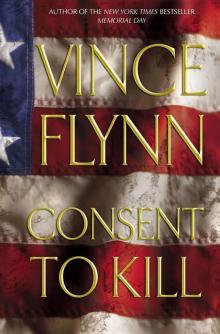 Consent to Kill
Consent to Kill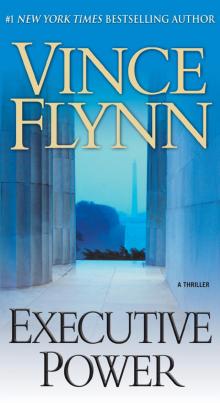 Executive Power
Executive Power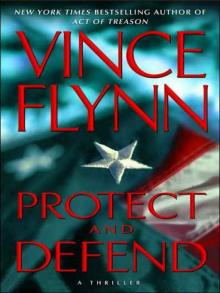 Protect and Defend
Protect and Defend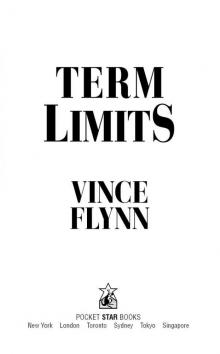 Term Limits
Term Limits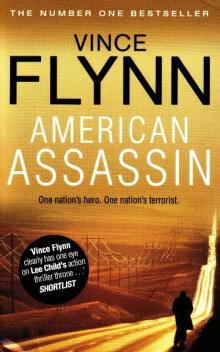 American Assassin
American Assassin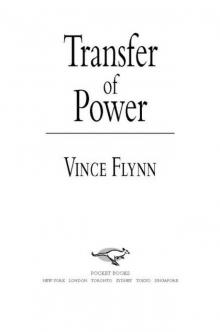 Transfer of Power
Transfer of Power Kill Shot
Kill Shot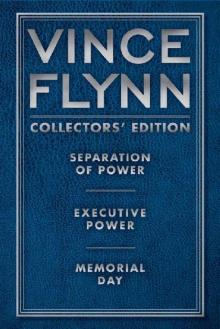 Vince Flynn Collectors' Edition 2
Vince Flynn Collectors' Edition 2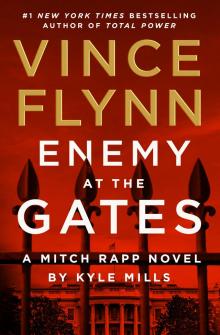 Enemy at the Gates
Enemy at the Gates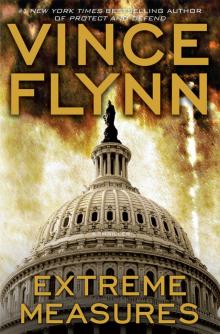 Extreme Measures
Extreme Measures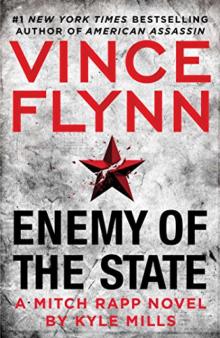 Enemy of the State
Enemy of the State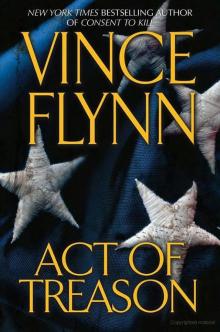 Act of Treason
Act of Treason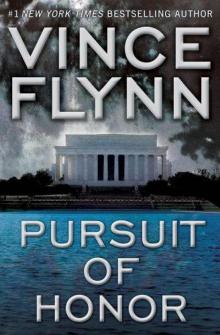 Pursuit of Honor
Pursuit of Honor The Survivor
The Survivor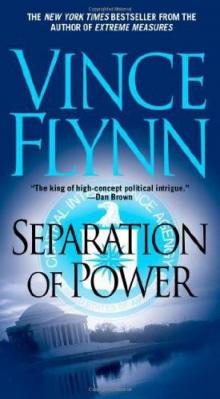 Separation of Power
Separation of Power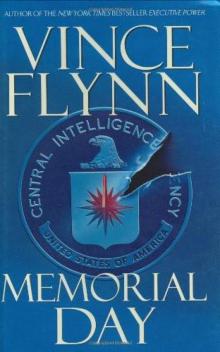 Memorial Day
Memorial Day The Last Man
The Last Man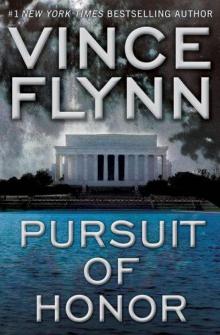 Pursuit of Honor_A Thriller
Pursuit of Honor_A Thriller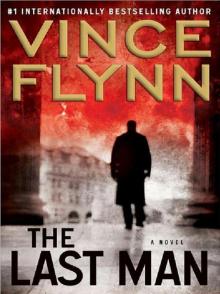 Mitch Rapp 13 - The Last Man
Mitch Rapp 13 - The Last Man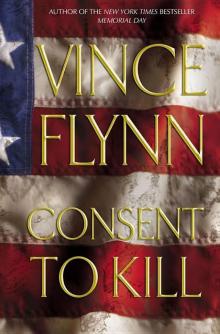 Consent to Kill:
Consent to Kill: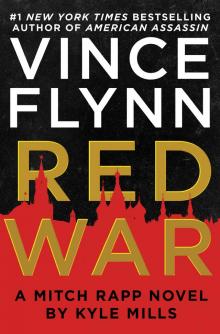 Red War
Red War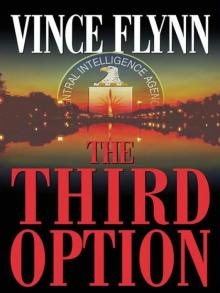 Mitch Rapp 02 - The Third Option
Mitch Rapp 02 - The Third Option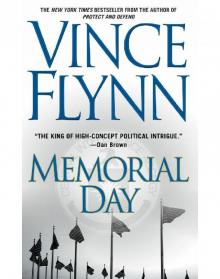 Mitch Rapp 05 - Memorial Day
Mitch Rapp 05 - Memorial Day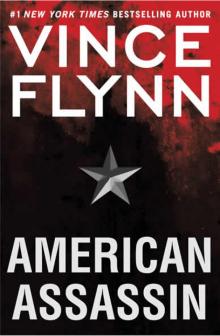 Mitch Rapp 11 - American Assassin
Mitch Rapp 11 - American Assassin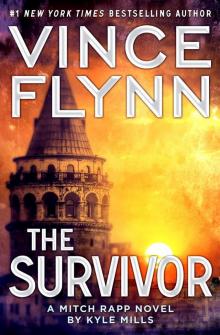 Mitch Rapp 14 - The Survivor
Mitch Rapp 14 - The Survivor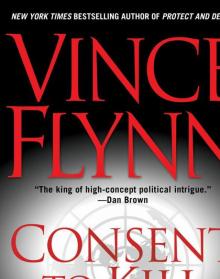 Mitch Rapp 06 - Consent to Kill
Mitch Rapp 06 - Consent to Kill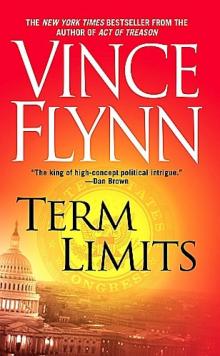 Term Limits mr-1
Term Limits mr-1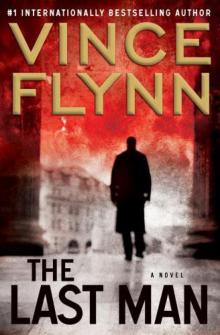 The Last Man mr-13
The Last Man mr-13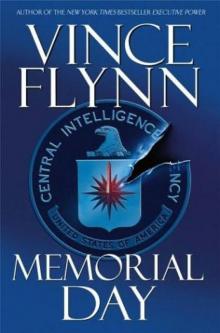 Memorial Day mr-5
Memorial Day mr-5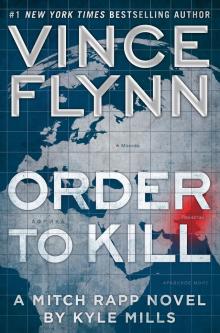 Order to Kill
Order to Kill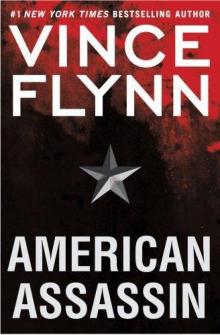 American Assassin: A Thriller
American Assassin: A Thriller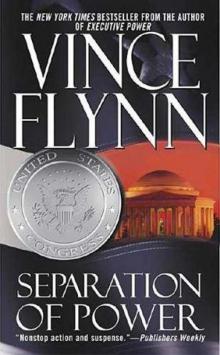 Separation of Power mr-3
Separation of Power mr-3